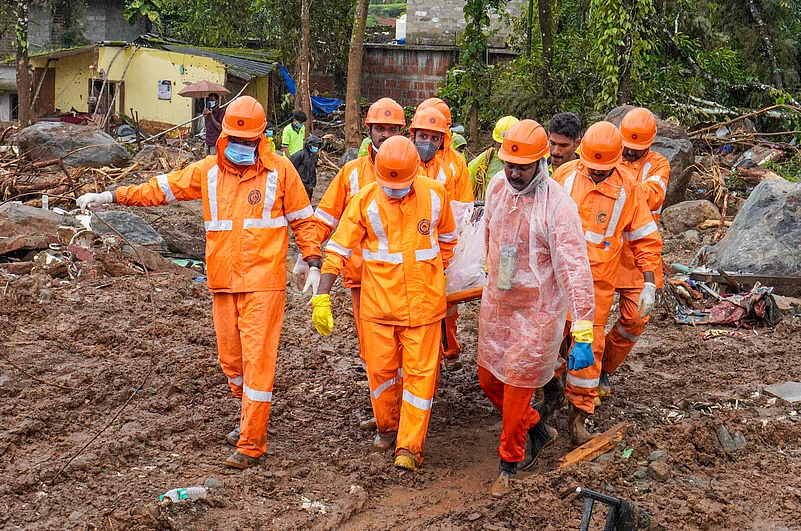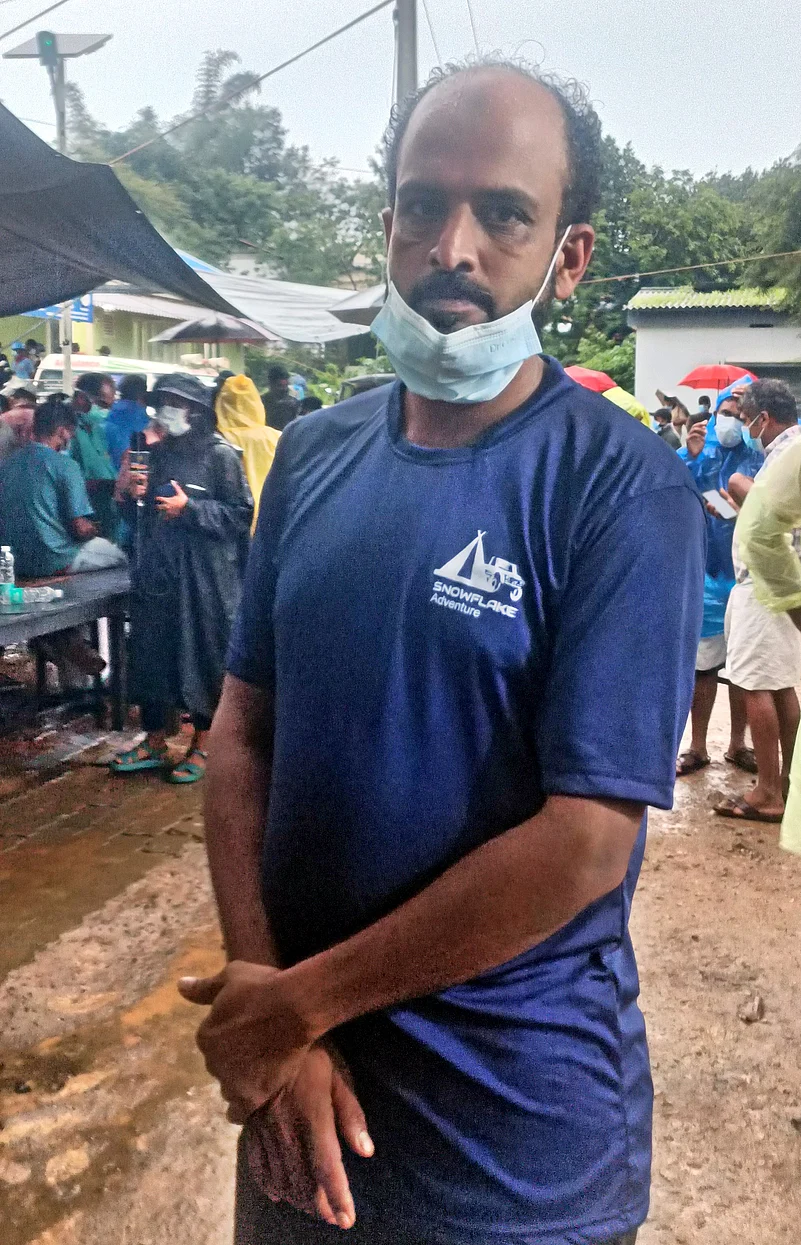The Family Health Centre at Meppadi has been converted into a temporary morgue, and human remains continue to arrive. Doctors, nurses, and volunteers are tirelessly working to examine, clean, and identify the bodies. Identified bodies are handed over to relatives, while unidentified remains are moved to a nearby community hall, also serving as a temporary morgue. Four days have passed since the devastating landslide, making the process of identifying bodies incredibly challenging and painful. For many, no immediate family members survived, and distant relatives struggle to recognise mutilated bodies or body parts. Social activists, who have been involved with the community even before the tragedy, assist in identifying the dead by recalling physical characteristics or other identifying marks.
The Unsung Heroes: Survivors In Action
The biggest strength of Wayanad is the people who faced disasters multiple times becoming rescuers. The trauma of facing death does not deter them from action?

Shyja Baby, an ASHA worker for 15 years in Mundakkai, is one such volunteer. She has identified around 100 bodies so far. "I know almost everyone in Mundakkai and Chooralmala. I've been working with these people since 2000. It's heart breaking to see the lifeless bodies of people we know coming in one after another, but there's no choice. I have to do it," says Shyja.
Shyja, a former Panchayat member and ASHA worker, is one of the hundreds who survived the landslide. Tragically, she lost nine family members, including her brother's wife's sister, her husband, two children, the wives of three brothers, and two grandchildren. So far, only three bodies, including those of two children, have been recovered. Shyja identified them all herself. She still awaits news about the rest of her missing family.

Shyja's strength to endure these circumstances did not come overnight. She was left in profound uncertainty when her husband died by suicide, leaving her with two young daughters, aged two and four, at the age of 25. He had gone to the UAE in search of a job but failed to find one, got trapped in debt. Unable to see a way forward, he took his own life. Shyja, however, resolved not to follow the same path. "I was in darkness; I had no idea how to move forward, but I couldn't choose the way my husband had. I got a small job with Childline, and that led me to social work."
Shyja discovered the strength of being among people. At 25, she joined Kudumbasree, Kerala's innovative poverty eradication program and one of the largest networks of women in the world, with 4.5 million members. She gradually rose to a leadership position and eventually became a district-level office bearer of Kudumbasree. After a few years with Childline, she became an ASHA worker.
ASHA workers are the lifeline of a Panchayat, knowing every person and their health details in the wards they cover. Shyja, familiar with everyone in the most affected wards—10, 11, and 12 of Meppadi Panchayat—ran in the 2015 Panchayat election and won from the 10th ward. Despite being elected, she continued her work as ASHA.
Shyja recalls the traumatic night of July 29th, when frantic calls began pouring in around midnight. She immediately contacted all the Panchayat members, the police, and media. Quick rescue efforts saved many lives, including those of Shyja’s elderly parents, though their house was completely washed away. Shyja and her daughters had already moved to Meppadi town after their home was destroyed in the 2019 landslide at Puthumala, making Shyja a survivor of multiple disasters.
Shyja also expressed frustration that the death toll could have been lower if the local administration had been more proactive. She recalls the massive evacuation efforts carried out in 2019. "On August 7, 2019, the day before the landslide, we, the entire Panchayat team, set out in heavy, relentless rain to evacuate nearly 2,000 people from 357 houses. We managed to save most of them, reducing the death toll as much as we could." If it is raining more than 200 mm per hour in 24 hours, it is logical to expect landslide to happen. In the 2019 landslide, only 17 people lost their lives in Puthumala.
Despite the grim task of waiting at the Family Health Centre for four days to identify bodies, Shyja remains determined. She hopes to identify every possible body or body part brought in. During a conversation with Outlook, she was called to identify a body. Returning moments later, visibly shaken, she said, "It was Mariam, I knew her." Yet, she quickly composed herself and continued speaking.
We met Nishad, a volunteer with the Panchayat's Rapid Response Team, at the Family Health Centre in Meppadi. Exhaustion was evident in his face and voice. He is among the hundreds who narrowly escaped the disaster that struck in the wee hours on July 29. In the early hours of that morning, when water began pouring in from the mountain, many, including Nishad, initially underestimated the severity of the situation, thinking only that the water level was rising. However, realising the danger, Nishad quickly moved his elderly parents, wife, and children to safety, along with his brother's wife and child. He also helped rescue his sister and her family, who lived nearby.

Nishad's story highlights Kerala's remarkable capacity for quick action in the face of natural disasters. "There is a voluntary organisation called Karunya in Chooralmala," he recounts. "They have equipment and trained volunteers. An earthmover was readily available at the site, allowing us to save around 50 people." The Karunya volunteers could swiftly help many to get out of the water by giving them ropes. Despite the efforts, nine went out of their hands and had gone with the debris. “We could not save them. They fell into the water from our hands,” Nishad recounts the harrowing experience that shook him the most. However, this trauma does not deter him from the rescue and relief work further.
Nishad still awaits news of missing family members: his cousin, the cousin's wife, and their two children. When asked about how many family members are missing, he hesitates, then says, "Family? Everyone was family. All our neighbours. We all lived together." His words trail off, heavy with emotion. Yet, he quickly regains his composure and returns to the seemingly endless phone calls.
Nishad has been a member of the ward-level Rapid Response Team since 2019. In Kerala, these teams are present in every ward across the Panchayats, each consisting of at least ten people trained in rescue and relief activities and health hazard management. The teams have been strengthened since the 2018 floods and have been active throughout the COVID-19 pandemic. Despite his traumatic close call with the landslide, Nishad has remained dedicated to the rescue operations. He has been on duty at the makeshift morgue in the Family Health Centre, helping to move bodies to crematoriums. Amidst this, he is occasionally called upon to identify the mutilated remains of those who perished.

Fifty-two-year-old Sujatha's ordeal during the landslide was like something out of a nightmare. When a tree fell onto her house, she found herself trapped in water and debris, the structure half-collapsed. Desperate, she broke through the kitchen tiles to escape, only to find her ten-year-old granddaughter entangled in the tree branches. Mustering all her strength, she freed the child and fled in the opposite direction, uphill.
Their escape led them into the forest, where they were met with an unbelievable sight: a wild elephant stood before them. Terrified, Sujatha spoke to the elephant as if pleading with it. "I asked him not to harm us, as we were running from death," she recalled. Miraculously, the elephant did not attack. They spent the entire night under continuous rain, huddled together in fear. At dawn, someone found them and brought them to safety. The resilience displayed by Sujatha, who saved herself and her granddaughter, spending an entire night in the rain and darkness in front of a wild elephant, has become a powerful symbol of survival.
In the midst of countless stories of sorrow and loss, these tales of courage and determination in the face of death highlight Wayanad's enduring strength and resilience. They serve as a testament to the incredible human capacity for perseverance and hope, even in the most dire circumstances.
Shahina KK in Wayanad
- Previous Story
 Elections 2024: Ashok Tanwar Joins Congress Again; Sehwag Endorses Congress Candidate In Haryana
Elections 2024: Ashok Tanwar Joins Congress Again; Sehwag Endorses Congress Candidate In Haryana - Next Story


























